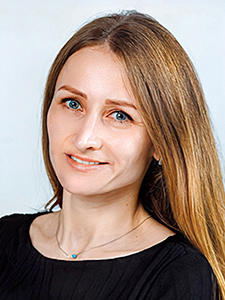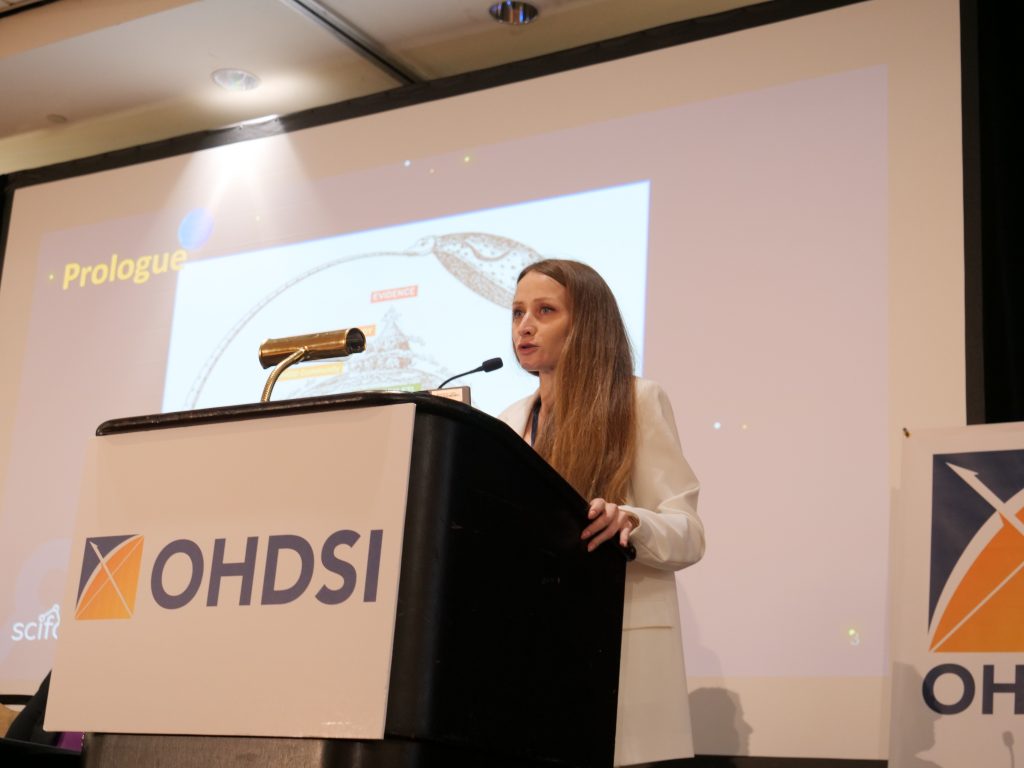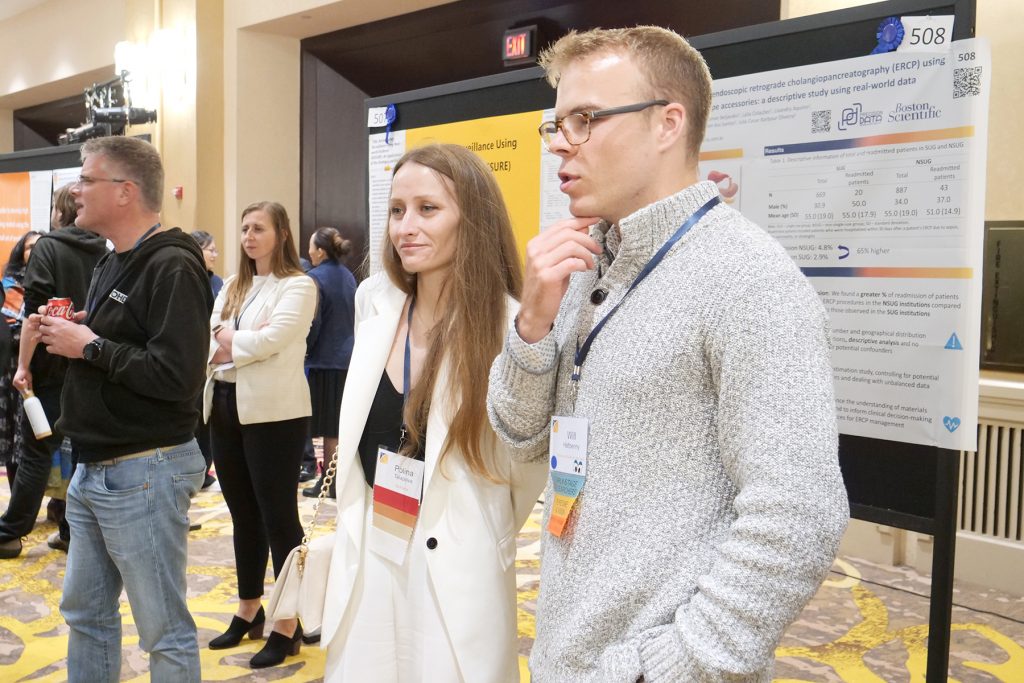- Who We Are
- Updates & News
- Standards
- Software Tools
- Network Studies
- Community Forums
- Education
- New To OHDSI?
- Community Calls
- Past Events
- Workgroups
- Tutorials
- 2025 ‘Our Journey’ Annual Report
- Current Events
- Support & Sponsorship
- 2025 Global Symposium
- 2025 APAC Symposium
- 2026 Global Symposium
- Github
- YouTube
- X/Twitter
- Newsletters
Collaborator Spotlight: Polina Talapova
Polina Talapova is the lead of the Medical Team at SciForce, based in Ukraine. She is also a OMOP CDM Consultant for Tufts Medical Center. As a medical doctor with a PhD in pathology, Polina has made significant contributions to the OHDSI Vocabulary team. Since 2017, she has played a key role in developing mappings and machinery for an extensive list of medical terminologies, including ICD9CM, ICDs, LOINC, ATC, CPT4, HCPCS, NCCD, CVX, OMOP Extension, LPDs and more. Her most notable work centers on the improvement of Condition, Measurement, and Drug domains.
Polina is an active member of various working groups within OHDSI, including Vocabulary, Psychiatry, Vaccine, GIS, CDM, and THEMIS. Her extensive experience in ontology engineering, ETL and semantic mapping has led to the development of numerous validity checks and the authoring of substantial OHDSI Vocabulary documentation.
She discusses her career journey, OHDSI standardized vocabularies, her passion to build a Ukraine National Node and more in the latest collaborator spotlight.

Can you discuss your background and career journey?
I was born and raised in Kharkiv, Ukraine, in a family of doctors, which greatly influenced my early aspirations. From a young age, I dreamed of becoming a doctor and helping people. In 2014, I graduated from Kharkiv National Medical University, where I laid the foundation for my medical career. Following my graduation, I pursued further specialization in the Department of Pathological Anatomy, completing an internship, clinical residency, and eventually a Ph.D. program. In 2023, I achieved a significant milestone in my career by earning a Ph.D. in pathology, which marked the culmination of years of dedication and hard work in the field of medicine. Simultaneously, since 2017, I have been applying my expertise in the intersection of healthcare and information technology, working with SciForce to advance innovations in the field.
How did you first connect with the OHDSI, and what inspires you to continue collaborating with this community?
My first encounter with OHDSI occurred in 2017 when Dmytro Dymshyts invited me to join SciForce, where I became a member of the OHDSI Vocabulary Team. This opportunity allowed me to immerse myself in OHDSI’s mission of improving health through a collaborative community, evidence-based knowledge, and data-driven solutions. As I became more involved, I embraced my role within OHDSI’s internal infrastructure, particularly in the domain of vocabulary knowledge. This experience made me a part of the larger OHDSI family, allowed me to build meaningful connections and gain valuable experience. I have been actively engaged in forums, working groups, workshops, and have presented annually at symposiums. The sense of purpose and community within OHDSI continues to inspire me, and I have no intention of slowing down.
 You have been a leader on our Vocabulary team for many years. For those who aren’t familiar, can you explain why standardized vocabularies are so critical for observational research?
You have been a leader on our Vocabulary team for many years. For those who aren’t familiar, can you explain why standardized vocabularies are so critical for observational research?
Standardized Vocabularies are like the Cosmic Turtle Akupara upon which the OHDSI elephants stand, supporting the entire world of observational research. Just as this mythical creature forms the foundation of the universe in ancient lore, Standardized Vocabularies provide the essential base that upholds the integrity and coherence of medical data. They enable diverse datasets to be translated into a common language, ensuring that every piece of information, regardless of its origin, contributes to a cohesive, unified understanding. This shared framework makes it easier to define phenotypes, build cohorts, and design studies, while also powering more advanced applications like knowledge graphs, machine learning, and clinical decision support. By turning raw data into a structured, interoperable format, these vocabularies make sure that research findings are reliable, reproducible, and relevant across different datasets and studies. In the end, they help drive smarter, evidence-based decisions in healthcare, creating a more connected and informed healthcare world.
What are the biggest challenges around keeping vocabularies updated, and how can the community assist in the effort?
The biggest challenge in keeping vocabularies updated is making vocabulary interaction simple, user-friendly, and accessible 24/7, while seamlessly integrating continuous updates with study and ETL workflows. The community can assist in overcoming this challenge by collectively supporting the development and adoption of a more dynamic Vocabulary Platform that replaces the traditional OHDSI Athena Browser. This platform would benefit from community-driven real-time feedback and collaboration among OHDSI experts, creating a user-friendly interface where users can propose, track, and comment on vocabulary changes directly from any device, eliminating the need for current contribution forms. The platform should offer advanced search functionality to independently search and analyze concepts and mappings on a single page. It would also integrate SSSOM for detailed mapping precision metadata, ensuring accuracy. Comprehensive role-based access control, version control with change logs, and customizable notifications would maintain transparency and security. Furthermore, the platform would support multiple export formats, API integration, and real-time error alerts, making it highly adaptable to various workflows. It should include tools for visualizing vocabulary hierarchies at different levels, archiving deprecated associations, and offering machine learning-based mapping suggestions (e.g., Jackalope API). Additionally, it would provide graphical interfaces for mapping management, custom vocabulary dashboards, and detailed reports on mapping accuracy. Moreover, the platform would support multi-language options, and a feedback loop for continuous improvement. It would also include guided interactive tutorials for new users, track the most frequently used terms, and allow for the scheduling of vocabulary tasks based on OHDSI Vocabulary GitHub Issues.
 Can you talk about the SciForce team and how it collaborates with the community?
Can you talk about the SciForce team and how it collaborates with the community?
The SciForce Team, founded by Inna Ageeva and Max Ved in 2015, has spent nearly a decade at the cutting edge of merging medicine with information technology. The team is a unique blend of experienced doctors, data scientists, data analysts, and machine learning engineers, all working together at the intersection of these fields. Since its inception, SciForce has been an active member of the OHDSI community, contributing significantly to the development and enhancement of various vocabularies over the past five years. Their work has spanned multiple projects, including updates to RxNorm Extension, ICDs, SNOMED, LOINC, CPT4/HCPCS, and ATC. In 2020, the team made a substantial impact by developing and introducing Jackalope, a tool designed for post-coordination based on SNOMED principles. This tool was well-received within the community. Building on this success, SciForce presented the AI-powered beta version of Jackalope Plus in 2024, which offers automatic OMOP mapping through the use of Large Language Models (LLMs).
The OHDSI Europe Symposium was a couple months ago, and it highlighted all the progress happening, including the National Nodes and EHDEN. How are you seeing the growth of OHDSI in Europe, and how crucial is that to the mission of global research?
On a personal note, my interest lies in seeing Ukraine represented among the National Nodes. Ukraine’s inclusion is crucial because the country is currently experiencing unique conditions that have resulted in unique health data, particularly due to the impact of the full-scale war. These data can provide invaluable insights into the effects of such extreme circumstances on population health, contributing to a richer and more nuanced global research landscape. By integrating Ukraine’s data into the broader OHDSI network, we can ensure that the lessons learned are not only applicable to Ukraine but also offer broader implications for understanding health resilience and recovery in the face of adversity.
What are some of your hobbies, and what is one interesting thing that most community members might not know about you?
I am deeply passionate about immersing myself in a good book. I am also interested in Gestalt psychotherapy, which I am currently studying. Music is a significant part of my life – I find joy in playing the piano and singing. Tango is another passion of mine. This dance is a whispered conversation between souls, where every step and embrace tells a story of passion, connection, and unspoken emotion. To stay active, I practice yoga and swim regularly. I also have a profound love for outdoor adventures, particularly traveling to the mountains. The Ukrainian Carpathians hold a special place in my heart, and I highly recommend experiencing their beauty in peacetime.
